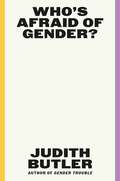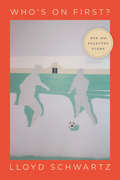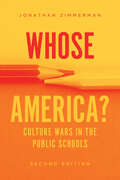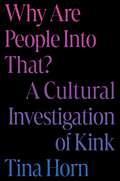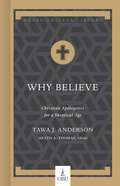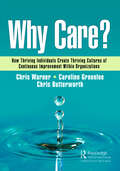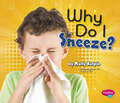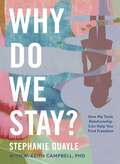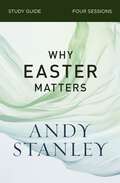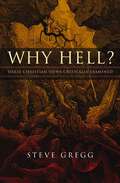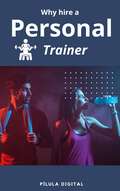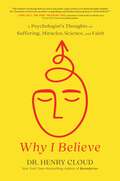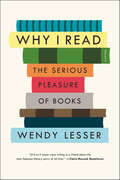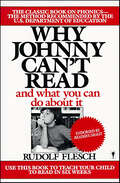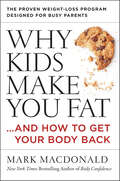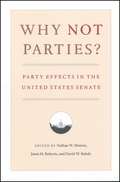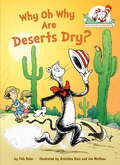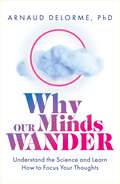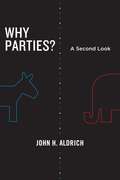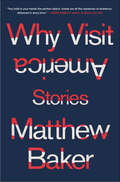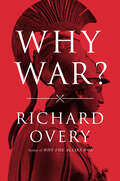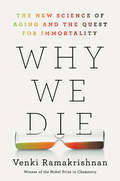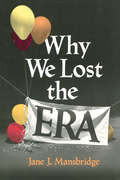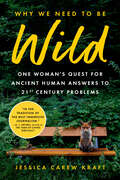- Table View
- List View
Who's Afraid of Gender?
by Judith ButlerNational Bestseller. Named a Best Book of 2024 (so far) by NPR, Harper's Bazaar, W, and Esquire, and a Most Anticipated Book of 2024 by The New York Times, The Washington Post, Time, Los Angeles Times, ELLE, Cosmopolitan, Kirkus, Literary Hub, Autostraddle, The Millions, Electric Literature, and them. "A profoundly urgent intervention.” —Naomi Klein "A timely must-read for anyone actively invested in re-imagining collective futurity.” —Claudia RankineFrom a global icon, a bold, essential account of how a fear of gender is fueling reactionary politics around the world. Judith Butler, the groundbreaking thinker whose iconic book Gender Trouble redefined how we think about gender and sexuality, confronts the attacks on “gender” that have become central to right-wing movements today. Global networks have formed “anti-gender ideology movements” that are dedicated to circulating a fantasy that gender is a dangerous, perhaps diabolical, threat to families, local cultures, civilization—and even “man” himself. Inflamed by the rhetoric of public figures, this movement has sought to nullify reproductive justice, undermine protections against sexual and gender violence, and strip trans and queer people of their rights to pursue a life without fear of violence.The aim of Who’s Afraid of Gender? is not to offer a new theory of gender but to examine how “gender” has become a phantasm for emerging authoritarian regimes, fascist formations, and transexclusionary feminists. In their vital, courageous new book, Butler illuminates the concrete ways that this phantasm of “gender” collects and displaces anxieties and fears of destruction. Operating in tandem with deceptive accounts of “critical race theory” and xenophobic panics about migration, the anti-gender movement demonizes struggles for equality, fuels aggressive nationalism, and leaves millions of people vulnerable to subjugation.An essential intervention into one of the most fraught issues of our moment, Who’s Afraid of Gender? is a bold call to refuse the alliance with authoritarian movements and to make a broad coalition with all those whose struggle for equality is linked with fighting injustice. Imagining new possibilities for both freedom and solidarity, Butler offers us a hopeful work of social and political analysis that is both timely and timeless—a book whose verve and rigor only they could deliver.
Who's on First?: New and Selected Poems (Phoenix Poets)
by Lloyd SchwartzNew and selected poems by renowned poet Lloyd Schwartz. For more than four decades, readers and critics have found Lloyd Schwartz’s poems unlike anyone else’s—a rare combination of the heartbreaking and the hilarious. With his ear for the poetry of the vernacular, Schwartz offers us a memorable cast of characters—both real and imagined, foolish and oracular. Readers experience his mother’s piercing flashes of memory, the perverse comic wisdom of Gracie Allen, the uninhibited yet loving exhibitionists of antique pornography, and eager travelers crossing America in a club-car or waiting in a Brazilian airport. Schwartz listens to these people without judging—understanding that they are all trying to live their lives, whenever possible, with tenderness, humor, and grace.Who’s on First? brings together a selection of poems from all of Schwartz’s previous collections along with eagerly awaited new poems, highlighting his formal inventiveness in tangling and untangling the yarn of comedy and pathos. Underlying all of these poems is the question of what it takes and what it costs to make art.
Whose America?: Culture Wars in the Public Schools
by Jonathan ZimmermanIn this expanded edition of his 2002 book, Zimmerman surveys how battles over public education have become conflicts at the heart of American national identity. Critical Race Theory. The 1619 Project. Mask mandates. As the headlines remind us, American public education is still wracked by culture wars. But these conflicts have shifted sharply over the past two decades, marking larger changes in the ways that Americans imagine themselves. In his 2002 book, Whose America?, Zimmerman predicted that religious differences would continue to dominate the culture wars. Twenty years after that seminal work, Zimmerman has reconsidered: arguments over what American history is, what it means, and how it is taught have exploded with special force in recent years. In this substantially expanded new edition, Zimmerman meditates on the history of the culture wars in the classroom—and on what our inability to find common ground might mean for our future.
Why Are People Into That?: A Cultural Investigation of Kink
by Tina HornFrom a #1 Apple podcast host, Lambda Literary fellow, and dominatrix comes a sex-positive, judgment-free cultural deep-dive into the world of kink. When celebrated BDSM educator Tina Horn first launched Why Are People Into That?!, publications from Vice to Buzzfeed heralded it as one of the best sex podcasts around. Each episode centered around a different fetish or fantasy, thoughtfully examining why, exactly, different strokes work for different folks. From sex workers and scientists to artists and activists, Tina&’s wide range of guests helped educate fascinated listeners across the world on the wide spectrum of humanity&’s appetites. With her listeners growing more and more insatiable, she soon realized that the only way to address the titular question with all the depth and nuance it deserved was to turn that idea into a book. From spanking, strap-ons, and sluts, to taboos involving cake, chains, and cannibalism, WHY ARE PEOPLE INTO THAT? explores the universal drives that shape even the most specific erotic tastes, and the cultural context that molds and is molded by the way we conceptualize pleasure, gender, fantasy, and power. With buoyant prose, Tina invites us to reconsider everything we thought we knew about sexuality. How, for example, should we think about "consensual nonconsent" in a post-#MeToo era? How does cross-dressing fit in with our evolving cultural understanding of gender performance and identity? And what do foot fetishists, fisters, and FinDoms have in common? Blending insightful cultural criticism, investigative journalism, and spicy anecdotes from Tina&’s 15+ years of hard-earned expertise in the sex industry and beyond, WHY ARE PEOPLE INTO THAT? is a philosophical-but-fun exploration of the prismatic spectrum of human desire and the expansive possibilities of pleasure. For fans of adrienne maree brown and Emily Nagoski, this raunchy and rousing book is perfect for anyone who is interested not only in the intricacies of what we desire, but in how desire itself really works.
Why Believe: Christian Apologetics For A Skeptical Age (Hobbs College Library)
by Tawa J. AndersonWhy bother with apologetics? Our skeptical age often finds the Christian faith unbelievable. For those seeking to defend the faith or strengthen their belief, Why Believe offers a timely resource: an apologetic that is both compelling and winsome. Anderson’s charitable and conversational tone conveys that Christianity is not only reasonable but also fulfilling. Appealing to both believers and unbelievers alike, the book provides accessible explanations of contemporary issues, from arguments for the existence of God and the validity of Christ’s resurrection to common questions about the practice of faith.
Why Care?: How Thriving Individuals Create Thriving Cultures of Continuous Improvement Within Organizations
by Chris Butterworth Chris Warner Caroline GreenleeWe live in an ever-changing world in which organizations find it increasingly difficult to stay ahead of the changes needed to be successful without thriving people. The authors believe that when people are valued and respected it improves their overall mental well-being and workplace experience, which in turn, makes them more motivated to help meet the purpose and objectives of the organization and adapt to external drivers.This book explores how mental well-being and a culture of continuous improvement are intertwined and mutually reinforcing. The authors contend that to create a sustainable culture of continuous improvement there must be an organization-wide focus on mental well-being at the individual level. A culture of continuous improvement nurtured in the right way, however, will indeed support mental well-being and help create a thriving organization.The key benefit of the book is demonstrating how important mental well-being is for sustainable organizational success. It explores this through many different lenses such as the individual, teams, leaders, and the organization as a whole, and explains the key elements needed for success. Leaders at all levels are able to understand why mental well-being is critical and how to nurture it in the workplace.In addition, the book explains the importance of diversity, equality, inclusion, and belonging, and how this is integral to mental well-being and a thriving organization. This book provides unique insight into how mental well-being and a culture of continuous improvement are intertwined explaining how thriving people and a thriving culture of continuous improvement create a thriving organization.
Why Do I Sneeze? (My Silly Body Ser.)
by Molly KolpinAchoo! A sneeze can be loud, silent, or silly. Take a trip inside the nose to find out just what makes us sneeze. Colorful photo and diagrams and informative text show young readers what causes an itchy nose.
Why Do We Stay?: How My Toxic Relationship Can Help You Find Freedom
by Stephanie QuayleYou or someone you love may be in a toxic relationship, but it doesn't have to stay that way. In this compassionate and practical resource, Stephanie Quayle shares her powerful story alongside psychologist Dr. W. Keith Campbell's professional insights to give you the help and hope you need—and remind you that you are not alone.When Stephanie lost her boyfriend in a plane crash, she faced intense grief and pain. Nothing compared, though, to the shock of discovering she had not been the only woman in his life. As her world unraveled around her, Stephanie realized that it had actually been unraveling from the start of their relationship—back when he promised her everything.In Why Do We Stay? Stephanie draws on her story to explain how to spot a toxic relationship, how to get out, and how to heal. Mental health expert Dr. W. Keith Campbell joins her in helping you see that:You can make a change in your lifeThere are warning signs to look for and ways to spot an unhealthy relationshipYou don&’t have to be a victim to narcissism or gaslighting or lose years of your lifeWhether you stay in or leave your relationship, healing and freedom are possible Why Do We Stay? is ideal for:Those who feel trapped in an unhealthy relationshipThose who are recovering from a toxic relationshipReaders searching for a resource—for themselves or for a friend—on narcissism, gaslighting, compulsive lying, and other destructive behaviors With a powerful blend of clinical research, gripping storytelling, and unvarnished hope, Why Do We Stay? empowers you to make changes in your life. You are not alone.Discover a way forward.
Why Easter Matters Bible Study Guide
by Andy StanleyHave you ever been at odds with God?Have you resisted, defied, or tried to bargain your way out of what you thought God wanted?You aren&’t alone. Scripture documents similar stories.In this Easter Study Andy Stanley looks at some of the people whose lives intersected with Jesus in the weeks leading to his crucifixion. Each of them had an agenda that put them at odds with God and Jesus. As you&’ll see, there&’s a little bit of them in all of us.The Why Easter Matters Study Guide includes session overviews, video teaching notes, discussion questions, personal reflection material, and a leader&’s guide.Sessions include:The High Cost of Following ChristThe Risk of Surrendering to GodThe God Who Can Be TrustedThe Foundation of Our FaithDesigned for use with the Who Needs Christmas / Why Easter Matters Video Study (9780310121121), sold separately. Streaming video also available.
Why Hell?: Three Christian Views Critically Examined
by Steve GreggMost people believe that hell is the final state of the condemned following the final judgment. At the same time, many people cannot comprehend why God created hell for the unsaved. Respected church fathers held a variety of views dating back to the early centuries of the church. This book explains views on why hell exists: unending suffering, the annihilation of the unrepentant, and the rehabilitation of the lost. Most Christians are unaware of the scriptural basis for each of these positions. Why Hell? is meant to educate the interested reader without advocating for any one point of view. The following are some of the book's features:Biblical vocabulary of hell and positions held throughout early Christian historyPositive cases presented on three perspectives: traditionalist, conditionalist, and restorationistCritiques of each viewHelpful charts at the back of the book that summarize and cross-examine the arguments for each viewSteve Gregg provides food for thought for both trained theologians and serious Christian readers who want all the data and then consider for themselves the consequences of three Christian perspectives on hell.
Why hire a personal trainer: Discover the advantages of hiring a trainer
by Pílula DigitalWhen you DECIDE to hire a personal trainer, you may FEEL a little overwhelmed at first. You are TRUSTING them to completely overhaul your lifestyle and help TRANSFORM you into a stronger, HEALTHIER person. It's normal to be anxious when taking such a MAJOR step. Thus, it would help if you had an IDEA of what to expect. It's not easy asking someone to HELP you change for the better. As humans, we are creatures of habit. But sometimes, it's IMPORTANT to take a step back and pay attention to those habits, as they aren't as good as they could be. RECOGNIZING your flaws and DEVELOPING motivation for changing them is the REASON why hiring a personal trainer can be FUNDAMENTAL to your success. Personal trainers have an OUTSIDE VIEW, and thanks to their KNOWLEDGE and set of SKILLS, they can adjust trivial things to CAUSE an impact bigger than you suppose. Remember, they are healthcare professionals, and their ADVICE is usually BASED on scientific research and proven theories.
Why I Believe: A Psychologist's Thoughts on Suffering, Miracles, Science, and Faith
by Dr. Henry CloudA leadership expert, clinical psychologist, and New York Times bestselling author asks the big questions and shares his early mental health struggles in this groundbreaking, uplifting book. World-renowned psychologist and leadership expert Henry Cloud has impacted millions of lives through his groundbreaking books and through his work coaching leaders of the most influential organizations in the world. But few people know the details of his own story and how he became one of the most beloved and respected psychologists and faith influencers in America. In this indelibly personal and vulnerable book, Dr. Cloud leads us through his early struggles with illness and depression and the miracles that healed him and led him to his calling as a healer of others. Through masterful storytelling combined with a deeply nuanced understanding of the human mind, Dr. Cloud invites readers to inhabit the spaces of suffering and elation that make us most human and to walk alongside of him as he ponders the great questions we are so often afraid to ask but which also give life meaning. Written in the vein of such groundbreaking books as An Unquiet Mind, When Breath Becomes Air, and On Being Mortal, Why I Believe is a masterwork in spiritual exploration from one of the great scientific minds and faith voices of our time.
Why I Read: The Serious Pleasure of Books
by Wendy Lesser"Wendy Lesser's extraordinary alertness, intelligence, and curiosity have made her one of America's most significant cultural critics," writes Stephen Greenblatt. In Why I Read, Lesser draws on a lifetime of pleasure reading and decades of editing one of the most distinguished literary magazines in the country, The Threepenny Review, to describe her love of literature. As Lesser writes in her prologue, "Reading can result in boredom or transcendence, rage or enthusiasm, depression or hilarity, empathy or contempt, depending on who you are and what the book is and how your life is shaping up at the moment you encounter it." Here the reader will discover a definition of literature that is as broad as it is broad-minded. In addition to novels and stories, Lesser explores plays, poems, and essays along with mysteries, science fiction, and memoirs. As she examines these works from such perspectives as "Character and Plot," "Novelty," "Grandeur and Intimacy," and "Authority," Why I Read sparks an overwhelming desire to put aside quotidian tasks in favor of reading. Lesser's passion for this pursuit resonates on every page, whether she is discussing the book as a physical object or a particular work's influence. "Reading literature is a way of reaching back to something bigger and older and different," she writes. "It can give you the feeling that you belong to the past as well as the present, and it can help you realize that your present will someday be someone else's past. This may be disheartening, but it can also be strangely consoling at times." A book in the spirit of E. M. Forster's Aspects of the Novel and Elizabeth Hardwick's A View of My Own, Why I Read is iconoclastic, conversational, and full of insight. It will delight those who are already avid readers as well as neophytes in search of sheer literary fun.
Why Johnny Can't Read: And What You Can Do About It
by Rudolf FleschThe classic book on phonics--the method of teaching recommended by the U.S. Department of Education. Contains complete materials and instructions on teaching children to read at home.
Why Kids Make You Fat: . . . and How to Get Your Body Back
by Mark MacdonaldIt's no secret that most of us get flabbier the older we get, and it's no surprise that the biggest spike in weight happens in the early stages of parenthood. Mark Macdonald knows the struggle himself, having gained thirty-five pounds after the birth of his son. It happened to him even as a nutritionist and former fitness model, so he knew he wasn't alone in the struggle. Along with his wife, Abbi, Mark has created this proven eight-week program specifically geared toward parents to help them shed the weight, discover new amounts of energy, and most importantly, create new sustainable habits to keep it from coming back.
Why Not Parties?: Party Effects in the United States Senate
by Nathan W. Monroe, Jason M. Roberts and David W. RohdeRecent research on the U.S. House of Representatives largely focuses on the effects of partisanship, but the strikingly less frequent studies of the Senate still tend to treat parties as secondary considerations in a chamber that gives its members far more individual leverage than congressmen have. In response to the recent increase in senatorial partisanship, Why Not Parties? corrects this imbalance with a series of original essays that focus exclusively on the effects of parties in the workings of the upper chamber. Illuminating the growing significance of these effects, the contributors explore three major areas, including the electoral foundations of parties, partisan procedural advantage, and partisan implications for policy. In the process, they investigate such issues as whether party discipline can overcome Senate mechanisms that invest the most power in individuals and small groups; how parties influence the making of legislation and the distribution of pork; and whether voters punish senators for not toeing party lines. The result is a timely corrective to the notion that parties don’t matter in the Senate—which the contributors reveal is far more similar to the lower chamber than conventional wisdom suggests.
Why Oh Why Are Deserts Dry? All About Deserts: All About Deserts (The Cat in the Hat's Learning Library)
by Tish RabeLaugh and learn with fun facts about desert animals, cacti, sand dunes, and more—all told in Dr. Seuss&’s beloved rhyming style and starring the Cat in the Hat! &“You may think that deserts are empty and bare, but you&’ll be surprised by the things we&’ll find there...&” The Cat in the Hat&’s Learning Library series combines beloved characters, engaging rhymes, and Seussian illustrations to introduce children to non-fiction topics from the real world! Journey through the deserts of the world and learn: how plants and animals have adapted to survive the unforgiving climatewhy deserts don&’t have to be hotwhat causes us to see miragesand much more! Perfect for story time and for the youngest readers, Why Oh Why Are Deserts Dry? All About Deserts also includes an index, glossary, and suggestions for further learning.Look for more books in the Cat in the Hat&’s Learning Library series!Cows Can Moo! Can You? All About FarmsHark! A Shark! All About SharksIf I Ran the Dog Show: All About DogsOh Say Can You Say Di-no-saur? All About DinosaursOn Beyond Bugs! All About InsectsOne Vote Two Votes I Vote You VoteThere&’s No Place Like Space: All About Our Solar SystemWho Hatches the Egg? All About EggsWish for a Fish: All About Sea Creatures
Why Our Minds Wander: Understand the Science and Learn How to Focus Your Thoughts
by Arnaud DelormeWe all daydream; we've all experienced that moment when we suddenly realise that instead of paying attention in a meeting or reading a book, our mind has wandered. In that moment our conscious mind has detached from the current task at hand and drifted elsewhere.Our attention is a powerful lens which allows us to pick out and filter relevant details from the vast amounts of information our brains receive – so how does our brain decide where to go when it wanders, why does it focus on one thing over another? How important is daydreaming and why do we do it?Traditionally daydreaming was considered to be a single state of mind. However, recent research has shown that not only are there different states of daydreaming, these states are actually governed by different neurological pathways, meaning not all mind wandering is the same!Here, Arnaud Delorme PhD examines the science and theory behind why we daydream, examining its potential purpose. He shows you how to tame your 'monkey mind' and offers easy techniques that will enable you to develop the skill of mind wandering to improve your mood and foster greater creativity.
Why Our Minds Wander: Understand the Science and Learn How to Focus Your Thoughts
by Arnaud DelormeWe all daydream; we've all experienced that moment when we suddenly realise that instead of paying attention in a meeting or reading a book, our mind has wandered. In that moment our conscious mind has detached from the current task at hand and drifted elsewhere.Our attention is a powerful lens which allows us to pick out and filter relevant details from the vast amounts of information our brains receive – so how does our brain decide where to go when it wanders, why does it focus on one thing over another? How important is daydreaming and why do we do it?Traditionally daydreaming was considered to be a single state of mind. However, recent research has shown that not only are there different states of daydreaming, these states are actually governed by different neurological pathways, meaning not all mind wandering is the same!Here, Arnaud Delorme PhD examines the science and theory behind why we daydream, examining its potential purpose. He shows you how to tame your 'monkey mind' and offers easy techniques that will enable you to develop the skill of mind wandering to improve your mood and foster greater creativity.
Why Parties?: A Second Look (Chicago Studies In American Politics Ser.)
by John H. AldrichSince its first appearance fifteen years ago, Why Parties? has become essential reading for anyone wishing to understand the nature of American political parties. In the interim, the party system has undergone some radical changes. In this landmark book, now rewritten for the new millennium, John H. Aldrich goes beyond the clamor of arguments over whether American political parties are in resurgence or decline and undertakes a wholesale reexamination of the foundations of the American party system.Surveying critical episodes in the development of American political parties—from their formation in the 1790s to the Civil War—Aldrich shows how they serve to combat three fundamental problems of democracy: how to regulate the number of people seeking public office, how to mobilize voters, and how to achieve and maintain the majorities needed to accomplish goals once in office. Aldrich brings this innovative account up to the present by looking at the profound changes in the character of political parties since World War II, especially in light of ongoing contemporary transformations, including the rise of the Republican Party in the South, and what those changes accomplish, such as the Obama Health Care plan. Finally, Why Parties? A Second Look offers a fuller consideration of party systems in general, especially the two-party system in the United States, and explains why this system is necessary for effective democracy.
Why Visit America: Stories
by Matthew BakerEqual parts speculative and satirical, the stories in Why Visit America form an exegesis of our current political predicament, while offering an eloquent plea for connection and hope.The citizens of Plainfield, Texas, have had it with the broke-down United States. So they vote to secede, rename themselves America in memory of their former country, and happily set themselves up to receive tourists from their closest neighbor: America. Couldn’t happen? Well, it might, and so it goes in the thirteen stories in Matthew Baker’s brilliantly illuminating, incisive, and heartbreaking collection Why Visit America.The book opens with a seemingly traditional story in which the speculative element is extremely minimal—the narrator has a job that doesn’t actually exist—a story that wouldn’t seem much out of place in a collection of literary realism. From there the stories get progressively stranger: a young man breaks the news to his family that he is going to transition—from an analog body to a digital existence. A young woman abducts a child—her own—from a government-run childcare facility. A man returns home after committing a great crime, his sentence being that his memory—his entire life—is wiped clean. As the book moves from universe to universe, the stories cross between different American genres: from bildungsroman to rom com, western to dystopian, including fantasy, horror, erotica, and a noir detective mystery. Read together, these parallel-universe stories create a composite portrait of the true nature of the United States and a Through the Looking-Glass reflection of who we are as a country.
Why War?
by Richard OveryWhy has war been such a consistent presence throughout the human past? A leading historian explains, drawing on rich examples and keen insight. Richard Overy is not the first scholar to take up the title question. In 1931, at the request of the League of Nations, Albert Einstein asked Sigmund Freud to collaborate on a short work examining whether there was “a way of delivering mankind from the menace of war.” Published the next year as a pamphlet entitled Why War?, it conveyed Freud’s conclusion that the “death drive” made any deliverance impossible—the psychological impulse to destruction was universal in the animal kingdom. The global wars of the later 1930s and 1940s seemed ample evidence of the dismal conclusion. A preeminent historian of those wars, Overy brings vast knowledge to the title question and years of experience unraveling the knotted motivations of war. His approach is to separate the major drivers and motivations, and consider the ways each has contributed to organized conflict. They range from the impulses embedded in human biology and psychology, to the incentives to conflict developed through cultural evolution, to competition for resources—conflicts stirred by the passions of belief, the effects of ecological stresses, the drive for power in leaders and nations, and the search for security. The discussions show remarkable range, delving deep into the Neolithic past, through the twentieth-century world wars, and up to the current conflict in Ukraine. The examples are absorbing, from the Roman Empire’s voracious appetite for resources to the impulse to power evident in Alexander the Great, Napoleon, and Hitler. The conclusion is not hopeful, but Overy’s book is a gift to readers: a compact, judicious, engrossing examination of a fundamental question.
Why We Die: The New Science of Aging and the Quest for Immortality
by Venki Ramakrishnan"Utterly fascinating." —Bill Bryson"An incredible journey." —Siddhartha MukherjeeA groundbreaking exploration of the science of longevity and mortality—from Nobel Prize-winning molecular biologist Venki RamakrishnanThe knowledge of death is so terrifying that we live most of our lives in denial of it. One of the most difficult moments of childhood must be when each of us first realizes that not only we but all our loved ones will die—and there is nothing we can do about it.Or at least, there hasn’t been. Today, we are living through a revolution in biology. Giant strides are being made in understanding why we age—and why some species live longer than others. Could we eventually cheat disease and death and live for a very long time, possibly many times our current lifespan?Venki Ramakrishnan, recipient of the Nobel Prize in Chemistry and former president of the Royal Society, takes us on a riveting journey to the frontiers of biology, asking whether we must be mortal. Covering the recent breakthroughs in scientific research, he examines the cutting edge of efforts to extend lifespan by altering our physiology. But might death serve a necessary biological purpose? What are the social and ethical costs of attempting to live forever?Why We Die is a narrative of uncommon insight and beauty from one of our leading public intellectuals.
Why We Lost the ERA
by Jane J. MansbridgeIn this work, Jane Mansbridge's fresh insights uncover a significant democratic irony - the development of self-defeating, contradictory forces within a democratic movement in the course of its struggle to promote its version of the common good. Mansbridge's book is absolutely essential reading for anyone interested in democratic theory and practice.
Why We Need to Be Wild: One Woman's Quest for Ancient Human Answers to 21st Century Problems
by Jessica Carew Kraft"In the tradition of the best immersive journalism." –A.J. Jacobs, author of The Year of Living BiblicallyA bold examination of how Paleolithic wisdom could solve our 21st century problemsJessica Carew Kraft, an urban wife and mom of two, was firmly rooted in the modern world, complete with a high-powered career in tech and the sneaking suspicion that her lifestyle was preventing her and her family from truly thriving. Determined to find a better way, Jessica quit her job and set out to learn about "rewilding" from people who reject the comforts and convenience of civilization by using ancient tools and skills to survive. Along the way, she learned how to turn sticks into fire, stones into axes, and bones into tools for harvesting wild food—and found an entire community walking the path back from our technology-focused, anxiety-ridden way of life to a simpler, more human experience.Weaving deep research and reportage with her own personal journey, Jessica tells the remarkable story of the potential benefits rewilding has for us and our planet, and questions what it truly means to be a human in today's world. For readers of A Hunter-Gatherer's Guide to the 21st Century and Hunt, Gather, Parent, Why We Need to Be Wild is a thought-provoking, unforgettable narrative that illuminates how we survived in the past, how we live now, and how each of us can choose to thrive in the years ahead. "Kraft shows us how we could all benefit from being a little less civilized." —Tiffany Shlain, author of 24/6: The Power of Unplugging One Day a Week
